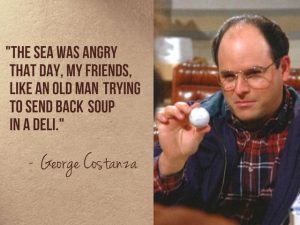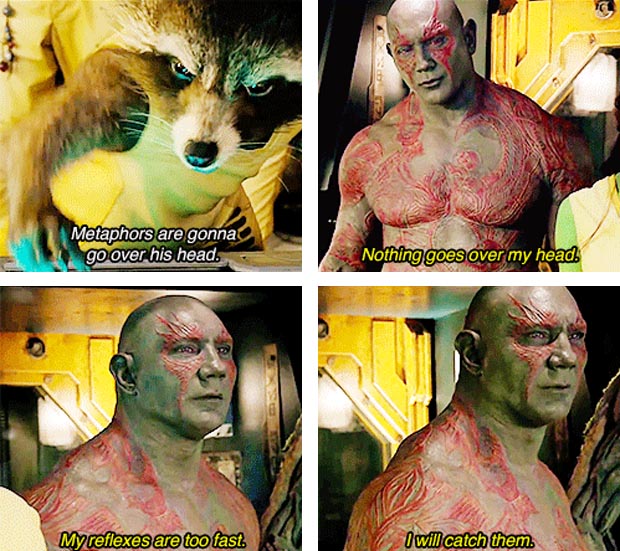Rhetoric: the beautiful art of persuasive speaking and writing that all ambitious people strive to master. It’s a powerful tool for success; within a social and communicative species like ours, so many goals can be achieved simply through the use of effective speech and composition. English is rife with handy rhetorical devices, and while you work on that NaNoWriMo novel, you should consider how to use language to its greatest potential, as much among your characters as with your audience.
So for your reference, here is a list of six popular rhetorical devices, complete with explanations and examples for how to use them. Enjoy!
1) Analogies are as easy as pie.

The sea was angry that day, my friends, like an old man trying to send back soup in a deli. – George Costanza, Seinfeld (Season 5, Episode 14 – The Marine Biologist)
(Image source: Playbuzz)
The analogy is one of the first rhetorical devices we learn to use in school. The basic formula is simple: take two similar ideas and connect them with “as” or “like” (which gives you a simile). They can also be more complex, making use of similes and metaphors to strengthen a comparison in the minds of readers and listeners, thus leaving a lasting impression on the audience.
Analogies are particularly useful for making complex ideas accessible by comparing unfamiliar concepts with familiar ones. Aside from providing simple explanations, they can also be used to create vivid images that engage the audience, such as “autumn leaves falling like golden rain” or “a young lady as beautiful and delicate as a rose”. Try not to use too many analogies at once, though; constantly comparing one image to another will not only get tiresome quickly, but could give the impression of unoriginality, especially if you’re comparing your work to someone else’s. Don’t make your stories as average as the next person’s!
2) Hyperbole is the greatest rhetorical device ever created!
 There’s nothing like exaggeration to get a point across. Who among us hasn’t shared our experiences of “the greatest thing ever”, “the worst day in history”, or “the most fun I’ve ever had in my entire life”? Hyperbole is a common device for creating emphasis, as exaggeration tends to have a great impact on an audience’s perceptions of a given description.
There’s nothing like exaggeration to get a point across. Who among us hasn’t shared our experiences of “the greatest thing ever”, “the worst day in history”, or “the most fun I’ve ever had in my entire life”? Hyperbole is a common device for creating emphasis, as exaggeration tends to have a great impact on an audience’s perceptions of a given description.
If you think about it, it’s funny how we’re inclined to exaggerate so often. After all, nobody literally “dies of embarrassment”, bags don’t literally “weigh a ton”, and friends don’t literally “go forever without seeing each other”. Yet we excuse this lack of literal sense in favor of the bolder imagery that fascinates us so, as if reaching to the limits of our imagination and beyond is simply second nature.
While it shouldn’t be used in excess, hyperbole is a good addition to any conversation that calls for dramatic emphasis. Have your characters use this device to add an informal or amusing tone to your dialogue, while in narrative you can use it to demonstrate intensity or create contrasts with normal descriptions. Use it wisely, and the hyperbole may just help you write the best stories ever!
3) Metaphors are a piece of cake.
All the world’s a stage,
And all the men and women merely players.
– William Shakespeare, As You Like It
Ah, metaphors: the celebrated heroes of poetic language. This is an especially popular device in rhetoric, using figurative speech to make strong comparisons where literal expressions would fall short. A close cousin of the simile and building block of the full analogy, the metaphor is an effective tool for constructing imagery that appeals to the audience’s imagination and draws them further into a story. Why say a soldier is “brave” when you can call him a “lion”, or say that a sound is “sweet” when you can call it “music to one’s ears”?
Metaphors have become so pervasive in modern language that we don’t even realize how heavily we rely on them in everyday speech. We suffer “broken hearts”, laugh “our heads off”, cry “rivers of tears”, and “bottle up” our anger. We’re “early birds” and “night owls”, “open books” and “loose cannons”, “black sheep” and “couch potatoes”, all lost in a “sea of faces” in the great “melting pot” that is our world. Is it even possible to speak completely literally anymore? I can only imagine how hard (and fun) it must have been to write Drax’s lines for Guardians of the Galaxy!

Drax the Destroyer doesn’t get metaphors (Guardians of the Galaxy, 2014)
The metaphor is useful for creating impact in a story, so long as it’s used sparingly and with good timing. If you find your writing is lacking some flair, a well-placed metaphor, whether short and sweet or long and complex, may be just the thing to “brighten up” your story and “paint a colorful picture” in your readers’ minds!
4) Oxymorons are stupidly brilliant!
And faith unfaithful kept him falsely true.
– Idylls of the King (Alfred Tennyson, 1859–1885)

Good night, good night! Parting is such sweet sorrow / That I shall say good night till it be morrow. – Juliet Capulet (Romeo & Juliet, 2.2.185–86)
(Screencap source: Romeo + Juliet, 1996)
This is one of my favorite rhetorical devices, for even though I don’t use it often myself, I enjoy the comical irony of using opposites to create a coherent phrase. The oxymoron is a figure of speech formed by combining contradictory terms, which often leads to humorous results: “jumbo shrimp”, “found missing”, “act naturally”, and so on. Some are even taken for granted as commonplace expressions, such as “virtual reality” and “science fiction”. And what horror fan could forget the classic “living dead”?
The beauty of the oxymoron is that it can just as easily slip by unnoticed as it can make us pause to think when pointed out. In rhetoric, this device can be used to create a paradox and draw attention to a contradiction, such as in Romeo’s criticism of the contrasts of love in Shakespeare’s Romeo & Juliet:
O heavy lightness, serious vanity,
Misshapen chaos of well-seeming forms!
Feather of lead, bright smoke, cold fire, sick health,
Still-waking sleep, that is not what it is!
– Romeo Montague (Romeo & Juliet, 1.1.184–87)
Overall, oxymorons are good for creating dramatic effect in poetry and in prose. They’re also popular as satirical devices, and can make great additions to a piece of humorous writing. So the next time you feel stuck writing comedy, why not try making opposites attract? You may be able to create some “seriously funny” works!
5) I’m not saying paralipsis is an evasive maneuver, but…
 This one was recently featured as a Word of the Week on my blog. It’s common to hear people use such phrases as “I’m not saying”, “not to mention”, and “needless to say”, only to immediately follow them up with a piece of information they just said they wouldn’t talk about. This is known as paralipsis, an ironic way to draw attention to a subject by explicitly stating you won’t mention it.
This one was recently featured as a Word of the Week on my blog. It’s common to hear people use such phrases as “I’m not saying”, “not to mention”, and “needless to say”, only to immediately follow them up with a piece of information they just said they wouldn’t talk about. This is known as paralipsis, an ironic way to draw attention to a subject by explicitly stating you won’t mention it.
A relatively colloquial device, paralipsis is used most effectively in speech rather than in writing, making it a good choice for character dialogue. One of the most notable examples in literature (as pointed out by Mike of M.C. Tuggle, Writer) is Mark Antony’s speech in Shakespeare’s Julius Caesar, in which Antony brilliantly uses this device to turn the crowd against Brutus and the other conspirators:
Have patience, gentle friends, I must not read it;
It is not meet you know how Caesar loved you.
You are not wood, you are not stones, but men;
And, being men, bearing the will of Caesar,
It will inflame you, it will make you mad.
‘Tis good you know not that you are his heirs;
For if you should, O, what would come of it!
– Mark Antony (Julius Caesar, 3.2.139–45)
In rhetoric, paralipsis has several uses: to indirectly point something out, to make a passive-aggressive comment, to criticize someone without being held accountable, or to explain something while politely avoiding a suggestion of ignorance (or, alternatively, to make a sarcastic comment about the audience’s ignorance). Though it should be used carefully, this is a highly effective device that can make for some exceptionally persuasive speech. I’m not saying it’ll help you reach or even surpass the level of your favorite authors, but learning to use paralipsis well will definitely improve your proficiency as a writer!
6) I love when people take sarcasm seriously.
Irony in its sharpest form, sarcasm is hailed as one of the most beloved tools in the comedic arsenal – so much so, that it’s become nearly impossible not to hear it in some form or other in everyday speech. Sarcasm is basically the use of wit to make a point, typically in a bitter way that conveys contempt. This device comes in many flavors, including deadpan, self-deprecating, manic, and even polite. It’s used to amusingly draw attention to the obvious, to mock oneself or others, or simply as a coping mechanism to make the frustrations of life a little more bearable. I know I’ve had those days that I couldn’t survive without a little sarcasm to tide me over!

Leonard has to clue Sheldon in on Penny’s sarcasm (The Big Bang Theory: Season 1, Episode 2 – The Big Bran Hypothesis)
(Image source: Tumblr)
Given its acidic nature, sarcasm is best exercised with caution. Like most humor techniques, it’s hard to teach because each person uses it differently and even harder to master because not everyone understands it, but sarcasm in particular is worth the effort as it’s a strong indicator of the writer and the readers’ intelligence. Use it in dialogue to demonstrate a character’s sharp wit or occasionally in narrative to indirectly criticize people and society, and if you must use it to address your readers, at least try not to be too offensive and alienate an audience who have no sense of humor. Or, you know, just do whatever you want. Why give a damn what the rest of the world thinks?
What are your thoughts on these rhetorical devices? Any other favorites you would add to this list?


My girlfriend doesn’t like it when I take her sarcasm seriously. She has yet to realize that I’m a humorless boor. 😀
Haha! My sister is fluent in sarcasm. It made growing up with her frustrating at times; I could never match her at a game of wits! Thanks for reading! 🙂